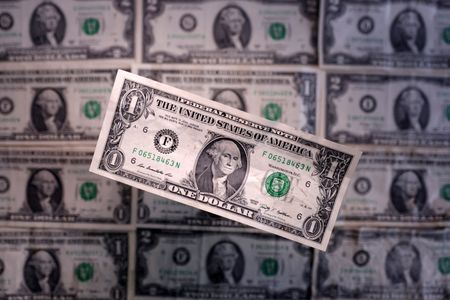By Alden Bentley and Jaspreet Kalra
NEW YORK/MUMBAI (Reuters) -Sterling and the Japanese yen slumped on Tuesday on growing investor anxiety about government finances, allowing the dollar to claw back some ground, while traders looked toward Friday’s U.S. jobs report for signals on the greenback’s next turn.
Renewed pressure on bond markets, with Britain’s 30-year borrowing costs rising to their highest levels since 1998, spilled over into currency markets, while gold hit fresh record highs.
“Negative developments outside of the U.S. are probably what’s driving the market today, in terms of dollar strength,” said Vassili Serebriakov, FX strategist at UBS in New York.
U.S. payrolls data to be released on Friday is likely to determine the path of the dollar in coming weeks, he added.
Sterling fell to a 3-1/2 week low and was 1.24% lower in afternoon trade at $1.3375. The dollar strengthened 0.84% to 148.40 yen, hitting its highest against the Japanese currency since August 1.
The euro fell 0.61% to $1.1637.
While worries about fiscal issues overseas were the main drivers when U.S. markets reopened after the Labor Day holiday, markets also keyed in on late Friday’s U.S. appeals court ruling that most of President Donald Trump’s tariffs are illegal. The divided court allowed for the tariffs to remain until October 14, to give the administration a chance to file an appeal with the Supreme Court.
Also, the return of the U.S. Congress on Tuesday leaves less than a month to pass legislation that would keep federal agencies funded and avert a partial government shutdown.
The midmorning release of a slightly weaker-than-expected ISM manufacturing PMI did not elicit much response in the forex market, with Friday’s August non-farm payrolls the main focus of the week.
While sterling was weighed down by lingering worries over Britain’s fiscal position ahead of a budget later this year, dovish-leaning remarks from a Bank of Japan official and the resignation of a key ruling party official pulled down the yen.
“Sterling’s underperformance is reflecting the growing concerns over the fiscal situation as we move closer to the budget and it becomes a bigger focus for market participants,” said Lee Hardman, senior currency analyst at MUFG.
Finance minister Rachel Reeves is expected to raise taxes in her autumn budget in order to remain on course for her fiscal targets, potentially adding to the challenge of boosting growth.
For the Japanese yen, heightened political uncertainty was likely to remain a drag, while the lack of a hawkish policy signal from Deputy Governor Ryozo Himino on Tuesday would encourage speculators to continue rebuilding short yen positions, Hardman said.
The dollar drew some support from an uptick in U.S. Treasury yields amid a broad bond market shakeout, with investors looking to the jobs report for cues on the path of benchmark interest rates.
The buck has trended lower all year, and lost more than 2% in August. Against a basket of major currencies, it was up 0.74% Tuesday afternoon, at 98.37.
Money markets are currently pricing in a 91% chance that the U.S. Federal Reserve will cut rates by 25 basis points this month, but those wagers could be tested by U.S. economic data lined up this week.
Concerns about the independence of the Fed have also been in focus for investors in light of Trump’s repeated push for lower policy rates and his move to fire Fed Governor Lisa Cook over allegations of mortgage fraud, which she denies.
Elsewhere, data released on Friday showed that euro zone inflation edged up in August but remained close to the European Central Bank’s 2% target, likely reinforcing market expectations that the ECB will keep benchmark rates unchanged in the near term.
Spot gold, meanwhile, steadied after touching an all-time high and was last up 1.59% at $3,531.08 a troy ounce.
(Reporting by Alden Bentley and Jaspreet Kalra; Editing by Ros Russell, Alex Richardson, Andrea Ricci and Edmund Klamann)








